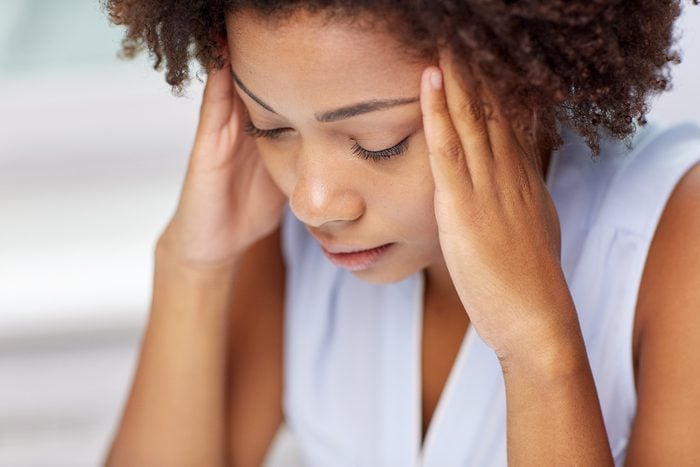Home Remedies That Can Help Your Headache Disappear

These natural home remedies for headaches will have you feeling better in no time.
In a world of tight schedules and high-speed everything, it’s no wonder we find ourselves popping an occasional pain reliever.
For a bad headache, you may want to choose one that contains a combination of aspirin, acetaminophen, and caffeine. (Off-limits…if you have a bleeding disorder, asthma, ulcers, or liver or kidney damage.)
But painkillers are only part of the solution. There’s much more you can do to escape the thump and wallop of a throbbing noggin.
Try these home remedies for headaches.
(Related: 6 Effective Pressure Points for Headaches)
Give it a rub
With a firm, circular motion, massage the web of skin between the base of your thumb and your forefinger. Continue massaging for several minutes, then switch hands and repeat until the pain resolves. Acupressure experts call this fleshy area trigger point LIG4 and maintain that it is linked to areas of the brain where headaches originate.
Heat up and cool down
Believe it or not, soaking your feet in hot water will help your head feel better. By drawing blood to your feet, the hot-water footbath will ease pressure on the blood vessels in your head. For a really bad headache, add a bit of hot mustard powder to the water.
For a tension headache, place a hot compress on your forehead or the back on your neck. The heat will help relax knotted-up muscles in this area.
It might sound contradictory, but you can follow up the heat treatment (or substitute it) by applying a cold compress to your forehead. (Put a couple of ice cubes in a washcloth or use a bag of frozen vegetables.) Cold constricts blood vessels, and when they shrink, they stop pressing on sensitive nerves. Since headache pain sometimes originates in nerves in back of your neck, try moving the compress to the muscles at the base of your skull.
Here’s an alternative to a cold compress: Soak your hands in ice water for as long as you can stand it. While your hands are submerged, repeatedly open and close your fists. This works on the same principle as an ice pack on your head—the cold narrows your dilated blood vessels.
(Related: 12 Foods That Can Make Your Headaches Worse)
Try the caffeine cure
Have a cup of strong coffee. Caffeine reduces blood-vessel swelling, and thus can help relieve a headache. This is why caffeine is an ingredient in some extra-strength painkillers like Excedrin. However, if you are already a heavy coffee drinker, skip this. Caffeine withdrawal can cause headaches, creating a vicious cycle.
Do something constrictive
Tie a bandanna, scarf, or necktie around your forehead, then tighten it just to the point where you can feel pressure all around your head. By reducing the flow of blood to your scalp, this can help relieve the pain caused by swollen blood vessels. You might try soaking the bandana in vinegar, a traditional headache remedy.
Soothe with scent
Certain essential oils, especially lavender, can help ease tension and relieve the pain of a headache. Gently massage a bit of lavender oil onto your forehead and temples, then lie back and enjoy the relaxing scent. For maximum relief, slip away to a room that’s cool, dark, and quiet. The longer you can lie there quietly breathing in the aroma, the better.
In addition to lavender oil, or instead of it, use peppermint oil. The menthol it contains can help dissolve away a headache. Its fragrance at first stimulates, then relaxes, the nerves that cause headache pain.
If you have a vaporizer, add seven drops lavender oil and three drops peppermint oil, then breathe in the relief. If you don’t, try sprinkling a few drops of peppermint oil on a tissue. Inhale deeply several times.
Try wringing out two wet peppermint tea bags and place them on your closed eyelids or forehead for five minutes.
Swallow some throb stoppers
An anti-inflammatory, ginger was traditionally used to treat headaches, and it seems to work. Grind up a half-teaspoon ginger, stir it into a glass of water, and drink this ginger juice. Or pour 1 cup hot water over 1 teaspoon freshly ground ginger, let the tea cool a bit, then drink it. Ginger is especially effective against migraines, though how it works is not well understood. Doctors do know that ginger has an effect on prostaglandins, hormone-like substances that contribute to inflammation. Ginger also helps control the nausea that so often accompanies migraines.
Try drinking a cup of rosemary tea. Some people say it helps keep a headache from getting worse. Pour 1 cup boiling water over 1 teaspoon of the dried herb, steep for 10 minutes, strain, and drink.
At least one grandmother counted on strong black tea with a few bruised whole cloves added. Tea contains caffeine, and cloves have anti-inflammatory properties, so the brew might indeed help a headache.
Down a large glass of water and see if it helps. Dehydration can cause a headache.
The power of prevention
If you grind your teeth or clench your jaw-either when you’re awake or asleep-take steps to prevent the problem. You might need to wear a mouth guard at night.
Eat at regular intervals. There’s evidence that a drop in blood sugar-the result of going too long without eating-can set the stage for headaches.
At least three days a week, spend 30 minutes walking, cycling, swimming, or doing some other form of aerobic exercise. These exercises are great stress-relievers.
Next: Am I Having a Headache or a Migraine? And More Migraine Questions, Answered




